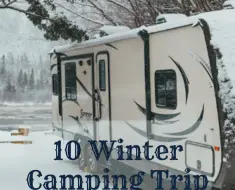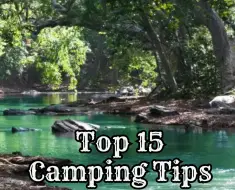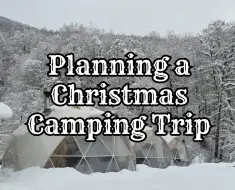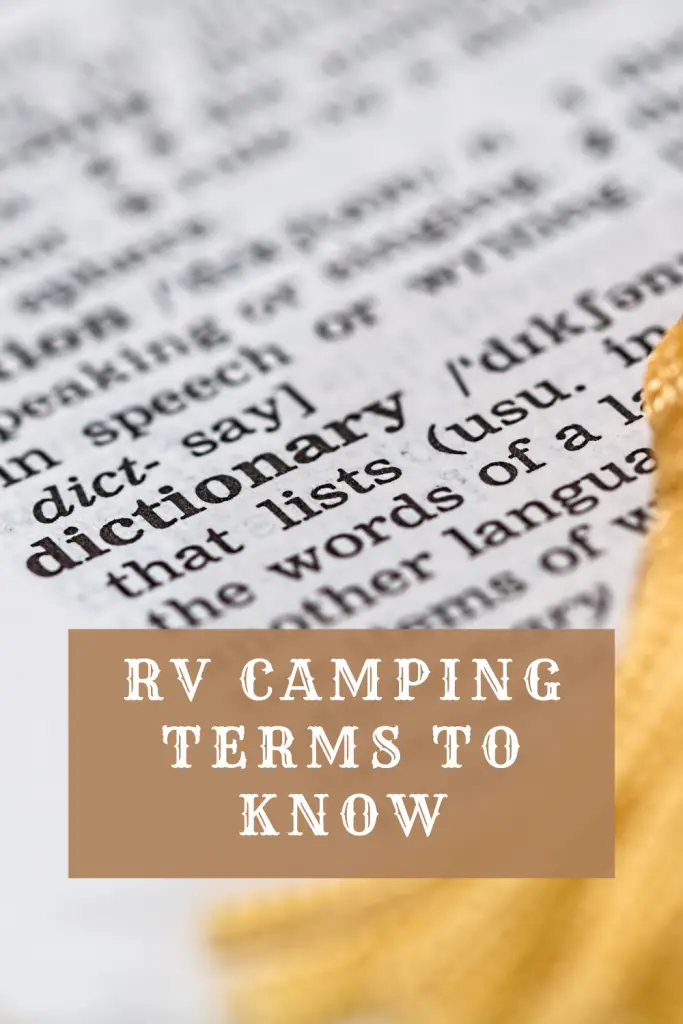
RVing has its own lingo. Knowing the jargon that comes with the territory of owning, driving, and using an RV. Knowing the lingo will help you communicate with others at an RV park, an RV dealership, or an RV repair shop. Hopefully, you never need one of those! This information is invaluable to greenhorns. It should be your first stop on your hunt for your new RV. In addition, it should provide you the language you need with the RV dealer. They can be tricky at times and overwhelm you with new terms. So learn them here first! Here are some key terms and phrases and what they mean. In terms of an RV camping guide, these are words you will see quite often.
Learn how to campfire cook in your new RV!
RV Terms – Types
- Bumper Pull: This is a travel trailer that uses a hitch from below the bumper of your tow vehicle. It is likely that you will also need a weight distributing hitch and sway control.
- Diesel pusher: An RV with a diesel engine in the back of the vehicle rather than in the front.
- Fiver: A “fifth wheel” or “fiver” is a camper that has to be towed by a truck because it doesn’t have an engine of its own and it has extra wheels underneath.
- Motorhome: An RV that is a complete home and vehicle in one. Now, these come in Class A, B, and C so make sure you know the size you’re looking for!
- Pop-up: Another tow-behind, much smaller, and needs to be unpacked and popped up to create a sleeping space.
- Rig: This is a general term that can refer to any RV.
- Toy hauler: An accessory for your RV that allows you to tow one or more “toys” behind the RV, like an ATV, boat, UTV, etc.
- Triple tow: When you tow two things behind your RV, like a boat on a trailer and your car behind that.
- Truck Camper: A truck camper is one that slides into the bed of a truck. It normally has a cab over the design to extend space for sleeping.

RV Terms – Structure
- Basement: No, RVs don’t really have basements. This just refers to the storage space/racks under the body of the RV.
- Blackwater tank: This is the tank where human waste goes. It has to be emptied often to avoid very smelly catastrophes.
- Chassis: The truck and wheels part of your RV. If your RV is a “fifth” wheel or tow-behind.
- Coach: A Motorhome
- Freshwater tanks: When your RV is not hooked up to water sources at a campground, you need these tanks to have a freshwater supply on hand. You use the water directly from the tanks and they are not connected to your RV in any way.
- Gray water tank: This is the tank that holds your sink water and possibly your shower water.
- Holding tanks: The three tanks located underneath and toward the back of the RV that store clean water and wastewater.
- Toad: When you tow your regular car behind your RV so that you can use your car to drive around and not have to drive your RV everywhere.
- Wheel Base: The distance between your RV’s wheels, affects how well the RV can make a turn. A wider wheelbase provides greater stability, but may also make it very difficult to make sharp turns.

RV Terms – Campsite
Bathhouse: You may feel cramped in some RV bathrooms and the Bathhouse provides you more space for a full shower. It is also a good place to use the restroom.
Boondocking: Slang in the RV world for camping anywhere with your RV, including supermarket parking lots. There are some guidelines for boondocking.

Dry camping: This means zero hookups. You’re just parked in a spot with no hookups.
Dump Station: This is the area in the campground where you will empty your black and gray tanks. For the love of all that is holy use the dump station and don’t free dump in your site!
FSU: Full Site Hookups is an abbreviated way of saying that a campsite has all of your plumbing and electrical hookups for your RV to run like a house on wheels.
Moochdocking: More slang, except that you are literally mooching off a friend by camping on their front lawn or in their backyard in your camper.
Learn how to find the best campsite for you!
RV Terms – Accessories
- Baggage Door: The baggage doors are the doors on the outside sides of your RV that allow you to access the storage or basement of your RV.
- Batteries: These provide power to the coach when you are boondocking without electricity. You should know that your batteries will not power everything like microwaves, TVs, or ACs.
- China Bombs: These are tires that are predominately made in China and fail catastrophically at a higher rate. There is no single brand that this applies to.
- Frameless Windows: These are windows that have no frame around the outside of them which makes for a more modern look on the exterior of the coach. There are some benefits and drawbacks of these types of windows.

- Inverter: A device that converts low-voltage DC (direct current) power from a battery to standard household AC (alternating current) power. This allows some portions of the coach to run off the batteries that wouldn’t normally do so.
- Power Jack: This tool allows you to raise and lower the front of your travel trailer to assist in leveling and hitching the trailer. There are also crank versions but save yourself time and opt for a power jack!
- Pressure Regulator: This device protects your RV’s internal plumbing from the campground’s water service. Water services may be at a higher pressure than the plumbing is rated for.
- Propane: To use the stove or heat water in your RV, you need a propane fuel tank. These require special RV-specific tanks too.
Still With us? Keep Learning More!
- Slam Latch: A slam latch is a specific type of latch on the baggage door that will click into place as it drops from the open position to ensure that it is secure. Just don’t forget to lock it!
- Slide: Slides expand out of the RV to provide additional interior space. They also add weight and watch your tow vehicle’s load rating.
- Solar: Many New RVs now come solar-ready to provide additional electricity when you are boondocking.
- Surge Protector: This device protects your coach from fluctuations in electricity coming from the campground’s electrical service. You place the surge protector inline and most include power testers.
- Sway Control: This is part of your trailering system which aids in preventing the trailer from swaying back and forth on the highway. You still need to be careful at higher speeds.
- Weight Distributing Hitch: This is a type of hitch that helps to push more weight to the front wheels of the tow vehicle to hopefully help distribute weight more evenly.
- Wet Bath: This is a bathroom in which the entire thing is watertight. The shower, sink, and toilet all share the same area.
The Manual

It also helps to have owner’s manuals to look at, supplement an RV camping guide, and read when you are considering the purchase of an RV. That way you can make comparisons prior to purchasing one of these vehicles. It is not just the owner’s manual of the RV your need. Your new rig is going to have lots of fun tools and gadgets which will all come with their own manuals. Make sure you have those to all of the critical items like the fridge, antennas, suspension, TV, etc. These will likely also include your warranty registrations.
Finding an RV
If you haven’t purchased an RV yet, there are plenty of resources to help you find an RV for sale. Be sure to do plenty of research and examine your budget and options before buying. It is possible to rent an RV, but most people willing to rent an RV will expect you to show that you have driven one before and that you are capable of driving one. RVs have unique braking systems that make driving one of these recreational vehicles very different from driving a car. Be sure to test drive several of these vehicles before choosing one to purchase.
There are dealerships specifically for RVs. You can also check out RVs at camping and outdoor expo shows, where you will find plenty of dealers and manufacturers interested in selling you an RV. Also, check online and in classified ads in your area for people that are selling their RVs. There are many large and small dealerships. You need to do your research on the specific dealership that you are looking to do business with. These three are common and large in the US and each have pros and cons. These are provided as references with no affiliation and may be a poor choice in your area. RESEARCH, RESEARCH, RESEARCH!


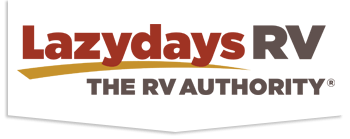
Final RV Terms Thoughts
There are many terms to consider when it comes to RVs. This list should get you started. It will help you speak a common language with the dealers. Hopefully, it will also help you identify some accessories that you will need to be successful when RVing. You are also likely to find it easier to discuss your new rig at the campground. With these RV terms, you will know the language and lingo. This will help you engage with others to ask questions and know more about their RVs. So make sure you put these into your back pocket for future use. However, you do it get outdoors! Most of all enjoy your new RV, whatever style it may be!
Did we miss any RV terms that you are always using? Tell us in the comments below, on our Facebook, or on Reddit! We would love to add them to this list!




